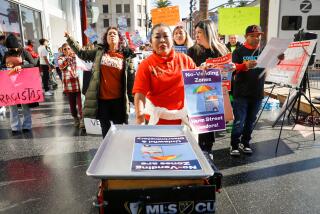Sex Video Booths Found in Violation of Glendale Zoning
- Share via
Operators of Glendale’s only sexually oriented bookstore violated city zoning laws by installing without permission about 20 token-operated video arcades, a judge ruled.
Daniel Bishop, president of Unique News and Video, and manager Gary Enea were found guilty Friday of violating a city use and occupancy permit by Glendale Municipal Judge Cheryl Krott.
Both could face a sentence of up to six months in jail and a $500 fine.
However, Glendale Assistant City Atty. Scott Howard requested a lesser fine and probation for the two men if the video arcade portion of the store is torn down. Sentencing is scheduled for Dec. 1.
Since August, Glendale undercover police arrested seven men on suspicion of lewd conduct in the video booths. Two similar arrests were made there last November, police said.
“I am very pleased,” Howard said after the verdict. “I think the evidence pretty well showed that they changed and intended to change what their occupancy was.”
For Sales and Rentals Only
Howard argued that the store’s use and occupancy permit allowed only retail sales and video rentals. He told the court that Bishop and Enea intentionally and “surreptitiously” added the closet-sized peep show booths after city officials inspected the facility at 5130 San Fernando Road.
The booths, installed about a week after the store’s May, 1986, opening, provide entertainment for patrons and are the store’s main source of income, Howard argued. The city building code requires a different occupancy permit to run entertainment establishments.
Enea, however, testified that the booths were not installed to entertain customers, but rather to show previews of videos for sale and for rent in the store. Retail sales and rentals, he testified, accounted for 70% to 75% of the store’s business, while purchase of 25-cent video booth tokens accounted for the remainder.
Two police officers testified that during undercover visits to the store, the majority of business took place around the video arcade, where holes between the walls of some booths allowed homosexual liaisons. Glendale Police Officer John McKillop told the court he was solicited for a sexual act while sitting inside one of the booths last September.
Under questioning from Howard, McKillop testified that the holes between the booths were smoothed around the inside and were cut with a saw. Howard said McKillop’s testimony proved that the openings were deliberately cut by the management of store to entertain and attract patrons.
“Those booths were clearly put up for amusement,” Howard said.
But Enea denied that he cut the holes and testified that he attempted to patch the holes with blocks of wood.
Not Mentioned in Codes
Joseph Liebman, defense attorney, told the court that the city building ordinance is vague as it makes no mention of video booths. As a result, he said, Bishop and Enea were unaware that the addition of the movie arcade would change the occupancy classification of their business.
“There’s nothing on the books now that applies to my clients . . . which would preclude them from doing what they’re doing,” Liebman told Krott.
Before issuing the ruling, Krott said she questioned why Bishop and Enea waited to add the booths until the building inspector issued the permit.
“The defendants didn’t undertake any change until the building inspector inspected” the site, Krott said, “. . . and that makes me wonder what their intent was.”
“It’s just a fact that certain people in our city don’t like what we sell and don’t like the citizenry to have the right to buy freely what we sell,” Enea said outside the courtroom.
But Howard disagreed.
Howard said: “We’re not trying to close down what they do. . . . We’re simply saying if you want to do it, get a license for it. They chose to circumvent the law.”
More to Read
Inside the business of entertainment
The Wide Shot brings you news, analysis and insights on everything from streaming wars to production — and what it all means for the future.
You may occasionally receive promotional content from the Los Angeles Times.










